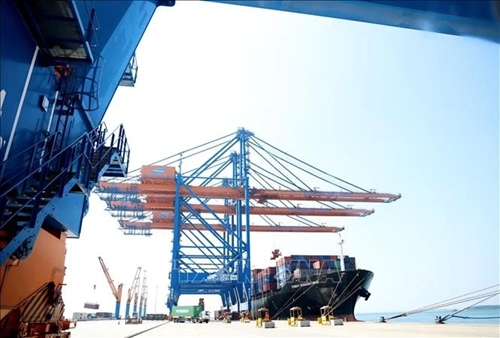Addressing the Government's regular press briefing in Hanoi on April 6, Hoai said the U.S.'s proposed reciprocal tariff of 46% on imports from Vietnam can have significant and multifaceted impacts on the Southeast Asian country’s exports and economic growth in the near future. It will affect the development of certain manufacturing and processing industries, foreign direct investment (FDI) attraction, domestic investment, as well as services and employment for local workforce.
    |
 |
|
At Gemalink port in Phu My township of Southern Ba Ria - Vung Tau province |
The Government is taking pro-active measures to achieve a balanced outcome with the U.S., he stressed, added that the Ministry of Industry and Trade (MoIT) has pro-actively implemented a series of measures, increasing engagement at various levels with the U.S. side to clarify Vietnam's stance in this issue.
Hoai also spotlighted the significance of the phone talks between Party General Secretary To Lam and U.S. President Donald Trump on April 4, which reaffirmed the key message from the Vietnamese Party chief that Vietnam is ready to negotiate with the U.S. to reduce import tariffs to 0% for goods imported from the U.S., and Vietnam’s desire to continue strengthening bilateral cooperation with the U.S. for the mutual benefit of both countries. This is an important step in addressing the tariff issue with the U.S., he said.
In the coming time, through the Vietnam-U.S. Trade and Investment Framework Agreement (TIFA)’s policy dialogue mechanism, the MoIT will coordinate with relevant ministries and agencies to maintain close exchanges with U.S. partners, work with the U.S. to address existing issues in bilateral economic and trade relations, and explore suitable frameworks for economic and trade cooperation to serve the interests of the business community of both countries, he noted.
According to the official, the first solution is to leverage the existing advantages of 17 free trade agreements with over 60 countries and territories, as well as 70 bilateral economic and trade cooperation mechanisms.
He also underlined the need to diversify export markets and continue pushing forward negotiations on FTAs with new markets in the Middle East, Latin America, Central Asia, and other emerging markets.
Attention should be paid to strengthening and improving the effectiveness of trade promotion efforts; enhancing logistics infrastructure to reduce transport costs and increase the competitiveness of Vietnamese goods; enhancing the capability of domestic producing and exporting enterprises to ensure their adaptation to market demands and development trends; and promoting the development of supporting industries to drive domestic growth and meet the origin requirements of other countries.
Hoai also emphasized that it is necessary to protect the legitimate rights of businesses, as well as provide early warnings and timely responses to the risks of lawsuits or trade defense cases to minimize potential damage to Vietnam; and expand the network of Vietnamese commercial offices abroad to provide updates on market information, business opportunities, and better support for businesses.
He said that despite facing many challenges, this is also an opportunity to restructure the economy towards rapid and sustainable development, focusing on green transition, digitalization, and innovation driven by science and technology, towards developing an independent and self-reliant economy, closely linked to deeper, more substantive, and effective international integration; expanding and diversifying markets, products and supply chains; and fostering localization and exploiting domestic markets.
To minimize risks from international trade fluctuations, businesses should regularly monitor and update information on market conditions and trade policies of other countries in order to promptly adjust their business strategies; ensure that products meet the technical, labor, and environmental standards of export markets to enhance competitiveness and reduce the risk of trade defense measures; and focus on controlling the origin of raw material supplies for production to ensure compliance with origin rules in FTAs, and avoid risks related to trade fraud.
The ministry will continue to support Vietnamese businesses in their efforts to export to the U.S. market, while also actively researching and expanding potential export markets, Hoai added.
Source: VNA